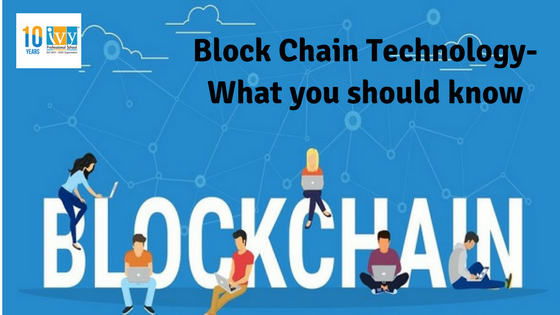3 Mar
Block Chain Technology – What you should know?
Ivy Mar 03, 2018 No Comments

While people were busy with Artificial Intelligence and Machine Learning, BlockChain technology surged in discussions. Even though it is a well-heard term, however, many of us are still unaware of what it actually is!
What is Block Chain?
Blockchain is a continuously growing list of records called blocks that are linked and secured using cryptography. By design, a BlockChain is inherently resistant to modifications in the data. It allows digital information to be distributed rather than copied, creating the backbone of a new type of Internet.
Applications:
- Decentralized Cryptocurrencies: In the era of cryptocurrencies, digital coins and virtual coins, security comes first. The blockchain records transactions on a wider, digital scale. It extends across the globe where each node in the network records and verifies the data of each transaction that occurs within the network. Records are permanent, comprehensive and public and blockchain comes to the rescue when the asset is questionable or risky.
- Financial Services: The traditional system of financial services that involved mediators to interrogate and resolve conflicts led to erroneous and delayed decisions. It would cost time, money and stress. With blockchain, the system has become cheap, transparent and efficient. Examples of financial services beneficiaries are trade processes in asset management, claim processes in insurance and cross border payments.
- Idea of Smart Property: Blockchain allows to embed smart technology in your property. Such registration can be stored on the ledger along with contractual details of others who are allowed ownership of this property. Smart keys could be used to facilitate access to the permitted party. By doing this blockchain helps reduce fraud and questionable situations. Examples of smart properties are Car, smartphones, hard money lending etc.
- Internet of Things: Blockchain is very valuable even when it comes down to companies where the devices are linked and the security of distributed files is a major concern. The Blockchain Smart Appliances helps use code to link with the internet and give more control over ownership and transferability. Supply chain sensors make the location of their supplies more transparent as they are transported around the globe.
- Smart Contracts: Industries like insurance, financial institutions, real estate etc. would benefit from blockchain’s indisputable way to update, manage, track and secure contracts. Smart contracts, those that are embedded with if-this-then-this statements and be executed without the involvement of an intermediary.
- Government: The security issues of voting requires blockchain as the hackers cannot manipulate votes since they are encrypted in the blockchain. By doing this it is ensured that the responsibilities have been vested in the correct person. Also, government agencies and NGOs are facilitated allowing interaction and exchange of information on a global scale.
- Identification and Passwords: Blockchain help secure your identity by encrypting it and protecting it from spammers. Passports, birth, wedding and death certificates and personal identification can be protected by blockchains.
These are just a few to mention while it has more applications in the practical world. Blockchain will expand its relevance in the years to come.
Ivy is the official learning partner of many large Analytics companies like Genpact, Capgemini, HSBC, Cognizant, eBay/PayPal. Ivy’s programmes on Big data, Data Science and its Business Analytics training in Bangalore, Kolkata and New Delhi have become benchmark courses for several analytics companies. A hybrid method of conducting training is adopted –classroom sessions for its centres at Kolkata, Bangalore and New Delhi, and live online sessions for all other locations.
Post Views: 128

Leave a Reply